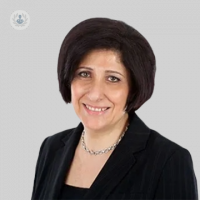Understanding menstrual disorders: Types, treatments, and management
Escrito por:Menstrual disorders encompass a range of conditions that can affect a woman's menstrual cycle, causing irregularities, discomfort, and other symptoms. These disorders can significantly impact a woman's quality of life and may require medical intervention for management. In this comprehensive guide, highly experienced consultant gynaecologist and pelvic surgeon Mrs Nadia Soliman explores the different types of menstrual disorders, their causes, symptoms, and available treatment options.

Types of menstrual disorders
1. Dysmenorrhea:
- Description: Dysmenorrhea refers to painful menstrual periods, commonly known as menstrual cramps.
- Causes: It is often caused by the contraction of the uterus, which can lead to discomfort and pain.
- Symptoms: Severe abdominal pain, lower back pain, nausea, vomiting, and diarrhoea.
2. Menorrhagia:
- Description: Menorrhagia involves abnormally heavy or prolonged menstrual bleeding.
- Causes: Hormonal imbalances, uterine fibroids, or underlying medical conditions can contribute to menorrhagia.
- Symptoms: Excessive bleeding that lasts longer than seven days, passing blood clots, fatigue, and anaemia.
3. Amenorrhea:
- Description: Amenorrhea is the absence of menstrual periods in women of reproductive age.
- Causes: Pregnancy, hormonal imbalances, excessive exercise, stress, or certain medical conditions can cause amenorrhea.
- Symptoms: Absence of menstrual bleeding for three or more consecutive cycles, accompanied by other symptoms depending on the underlying cause.
4. Premenstrual syndrome (PMS):
- Description: PMS refers to a combination of physical and emotional symptoms that occur before menstruation.
- Causes: Hormonal fluctuations during the menstrual cycle are believed to contribute to PMS.
- Symptoms: Mood swings, irritability, bloating, breast tenderness, fatigue, and headaches.
Treatment options for irregular periods
1. Medications:
- Nonsteroidal anti-inflammatory drugs (NSAIDs) can help alleviate pain associated with menstrual cramps.
- Hormonal birth control methods, such as pills, patches, or hormonal intrauterine devices (IUDs), can regulate menstrual cycles and reduce symptoms of menstrual disorders.
- Tranexamic acid may be prescribed to reduce heavy menstrual bleeding.
2. Lifestyle changes:
- Maintaining a healthy diet rich in fruits, vegetables, and whole grains can help regulate hormone levels and reduce symptoms of menstrual disorders.
- Regular exercise can alleviate stress, improve mood, and reduce the severity of menstrual symptoms.
- Stress management techniques, such as yoga, meditation, or deep breathing exercises, can help reduce the impact of stress on menstrual cycles.
3. Alternative therapies:
- Acupuncture and acupressure may provide relief from menstrual pain and regulate menstrual cycles.
- Herbal supplements, such as chasteberry or evening primrose oil, are believed to help balance hormones and alleviate symptoms of menstrual disorders.
When to seek medical attention
It's essential to consult a doctor if you experience any of the following:
- Severe or debilitating menstrual cramps that interfere with daily activities.
- Excessive menstrual bleeding that lasts longer than seven days or requires frequent changes of sanitary products.
- Absence of menstrual periods for three or more consecutive cycles.
- Persistent symptoms of premenstrual syndrome (PMS) that significantly affect your quality of life.
In conclusion, menstrual disorders are common conditions that can have a significant impact on a woman's physical and emotional well-being. By understanding the different types of menstrual disorders and available treatment options, individuals can effectively manage their symptoms and improve their overall quality of life. If you're experiencing irregular periods or other menstrual concerns, don't hesitate to seek guidance from a doctor for personalised care and support.
Mrs Nadia Soliman is a renowned consultant gynaecologist and pelvic surgeon with over 25 years of experience. Mrs Soliman is based in Dorchester and Poole. If you would like to book a consultation with Mrs Soliman you can do so today via her Top Doctors profile.


